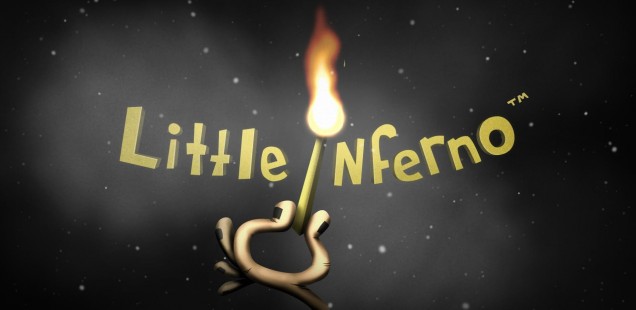
Off the Grid: Little Inferno
Not So Hot. By Zachary Brictson.
One of the first ‘toys’ I could throw into my Little Inferno fire place was a credit card, an unsettling notion that didn’t exactly instill confidence in my purchase of Tomorrow Corporation’s latest title. Touching the plastic to the heat quickly swallowed it in flames, spewing coins to spend on more toys. It’s pointless, but what’s both cruel and interesting about Little Inferno is that it knows its pointless, and yes, perhaps even a waste of money.
Little Inferno would have you believe it’s entirely without objectives, as your quirky neighbor Sugar Plumps reminds you in her letters describing the game’s aimlessness. In actuality though, it’s about matching, burning clever combinations of toys to meet a certain quota before advancing to new catalogs to order from. Descriptions of possible matches, like ‘Spring Time’, can be challenging, but in this case, simply hinting at the pairing of an alarm clock and flower.
Once you get several catalogs deep, memory begins to play a key role as matches span across both the old and new. Protein supplements, galaxies, nuclear bombs and opera singers, there’s a lot of bizarre stuff to throw in the fire and to keep track of for when new matches are unlocked. For example, to achieve the ‘Online Piracy’ match, you’ll need to remember the toy pirate from the first catalog and pair it with the internet cloud you can purchase in the fifth.
That sort of contemporary reference and charm is frequent in Little Inferno. There’s even several pertaining to other popular indie titles like a cardboard Meat Boy or the spider from Limbo, and item descriptions are often funny jabs at consumerist society. But if that’s what the experience is ultimately getting at, it feels too transparent to make its cultural criticisms powerful. If anything, the game and its ending feel a bit preachy.
Not that the fireplace can’t be entertaining, as various items give off all sorts of disturbing and pleasing effects in the flame. But they soon die down, leaving you with a feeling of emptiness, which may very well be the point of the game. Creating brief pleasure and then leaving you in the cold as you spend several minutes waiting for your next shipments to arrive, downtime probably intended for introspection.
But at these times I found myself deviating from the game, minimizing it to check Facebook, using the bathroom, even brewing up a cup of tea as I waited for the last toy to arrive. Sugar Plumps’ letters and the constant forecasts of snow had made me anxious to see a meaningful finale – Kyle Gabler’s foreboding musical contributions add to this – but I was far past the enjoyments of the fire itself.
And maybe that’s what Little Inferno wanted, for me to realize how senseless it all was. But bored and with unquenched curiosity as well? Probably not.
Zachary Brictson is a Computer Science graduate from Northern Illinois University who chooses to write about games rather than code them, contributing to physical publications like The Printed Blog, sites such as Playstation Universe, and his own blog, Up Magic.